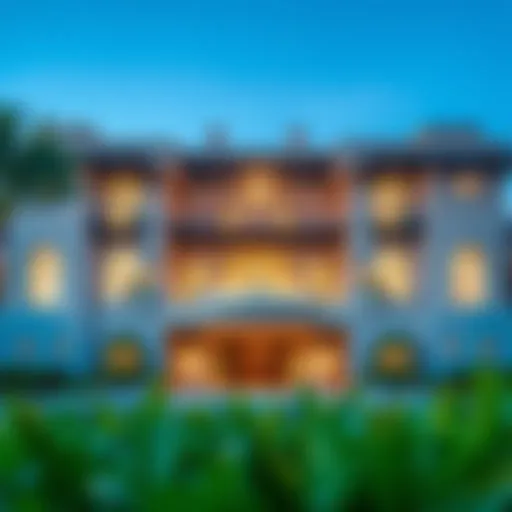Today's Iftar Time in Dubai: A Complete Guide
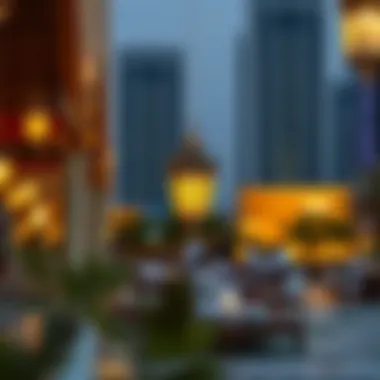
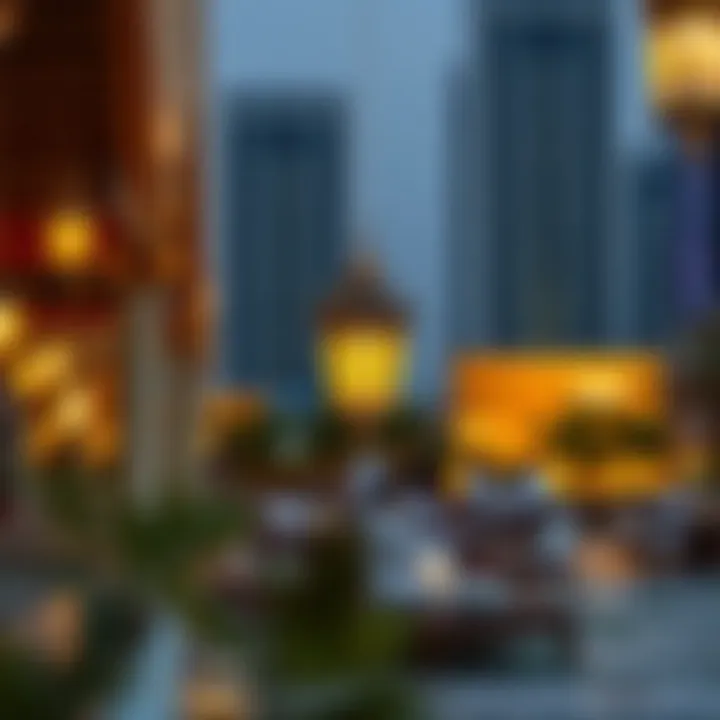
Intro
As the holy month of Ramadan unfolds, a unique sense of community and spirituality fills the streets of Dubai. For residents and visitors alike, the iftar — the evening meal to break the fast — becomes a focal point of daily life. Understanding today's iftar time, along with its significance and cultural relevance, is paramount for anyone navigating the city's vibrant atmosphere during this period.
Dubai's skyline, dotted with iconic landmarks, serves as a backdrop to innumerable iftar gatherings. The timing of this daily ritual not only signifies the end of a day of fasting but also reflects the rich tapestry of tradition interwoven with the cosmopolitan nature of the emirate. Across the city, various locations offer diverse experiences, from sumptuous buffets to intimate family settings. As we explore today's iftar time, it is crucial to appreciate the nuances of timekeeping in this fast-paced environment.
Significance of Iftar Time
In Islamic tradition, the exact time for iftar is determined by the setting of the sun. This moment is not merely about breaking the fast; it is a profound spiritual moment, a time for prayer, reflection, and togetherness. The communal aspect of iftar encourages social bonds, allowing friends and families to gather and share meals, strengthening community ties in a land known for its multitude of cultures.
The timing of iftar serves as a reminder of the importance of patience, gratitude, and unity, particularly during Ramadan.
As we delve into the specifics of today's iftar time, it is vital to appreciate how variations exist across Dubai. Differing areas may experience slight shifts in timing due to geographical factors, causing discrepancies that can inform those looking to join in this quintessential practice. Understanding these variations enhances the experience for those partaking in the evening meal, ensuring that they gather not just on time but with full awareness of the cultural significance behind this sacred tradition.
In the coming sections, we will navigate the factors influencing the timing of iftar, highlight key locations for breaking the fast, and reveal the unique ways in which Dubai embraces this special month. Whether you are a long-time Dubai resident or a newcomer eager to immerse yourself in local traditions, this comprehensive guide offers essential insights to enhance your Ramadan experience.
Understanding Iftar
Iftar represents a significant cultural and spiritual practice during Ramadan, and grasping its essence is crucial, especially for those navigating through Dubai's vibrant landscape during this holy month. It's not just about breaking a fast; it’s the moment when communities come together, fostering connections and celebrating shared traditions. For residents and visitors alike, knowing when and how to participate in iftar can enrich their experience and deepen their appreciation of this age-old custom.
Definition and Significance
Iftar, derived from the Arabic term meaning "to break the fast," marks the end of daily fasting for Muslims. This practice unfolds at sunset, when individuals consume dates and drink water to gently end their fast. The significance of iftar goes beyond mere sustenance; it symbolizes gratitude for life's blessings and an opportunity to reflect on spiritual commitments.
During iftar, families often gather around the table, sharing delicious meals, laughter, and companionship. It serves as a reminder of community bonds and the importance of supporting one another during Ramadan. For many, it’s a time to reconnect not only with family but also with friends and neighbors, creating a sense of belonging that is essential for community cohesion.
Historical Context
The tradition of iftar has deep historical roots, tracing back to the time of the Prophet Muhammad. As the story goes, during the initial revelations, Prophet Muhammad fasted at the request of a divine command. He broke his fast by consuming dates and water, establishing a custom that persists today. The ritual has evolved but retains its core values of sharing, compassion, and caring for the less fortunate.
In many cultures, including in Dubai, iftar has transformed into larger gatherings, which reflect regional culinary delights and hospitality. Historically, this moment was a modest affair, but today it can include elaborate meals at lavish hotels or communal events. As a result, iftar has become more than just a religious obligation; it has blossomed into a celebration of culture, tradition, and community spirit.
Today's Iftar Time in Dubai
Understanding today’s iftar time is crucial, especially in a city as dynamic as Dubai, where cultures intermingle and traditions run deep. The time for iftar marks a significant moment during Ramadan, rejuvenating a community that actively engages with its cultural heritage. For residents and visitors alike, being aware of the exact iftar timing can enhance the experience of this holy month, allowing for better planning and more meaningful participation in cultural traditions.
Exact Timing
The precise timing of iftar changes daily and is influenced by various factors, including geographical location and astronomical phenomena. Typically, it occurs at sunset, but this varies slightly based on where one is situated in the city. For example, in Dubai, as the sun dips below the horizon at approximately 6:30 PM during Ramadan, the atmosphere transforms. Families and friends gather, ready to break their fast with a variety of provisions.
- You can find out today's exact iftar time from local mosques or through apps dedicated to Islamic calendar references, ensuring that plans are made accordingly.
- It’s essential to note that those who may be residing in nearby towns like Sharjah or Ajman will have slightly different timings, so a reliable source must be consulted.
For many, anticipating the call to prayer is a shared moment of excitement; it instills a sense of unity across diverse communities.
Variations by Location
In a sprawling metropolis like Dubai, not all neighborhoods experience sunset at the exact same moment. Various locations can witness a few minutes’ discrepancy in the iftar timing.
- Downtown Dubai might experience a quick sunset due to the tall skyscrapers casting shadows, while a location near the coast may see the sunset extended by a few minutes.
- Seasonal changes also play a role — in the northern parts of the emirate, such as the Arabian Ranches, the sun might set a tad later compared to urban areas.
This variation adds an interesting layer to how iftar is experienced. Families in quieter districts might opt for a more laid-back setting, while those in bustling areas could find themselves in the heart of a lively community scene with bustling markets and communal tents.
“The importance of shared meals during iftar reinforces bonds of friendship and family, making it a cherished part of Ramadan.”
Overall, understanding both the exact time for iftar and the variations that exist within different locations helps residents and visitors plan their observances effectively, ensuring that they can fully appreciate one of Ramadan’s most beautiful traditions.
Factors Influencing Iftar Timing
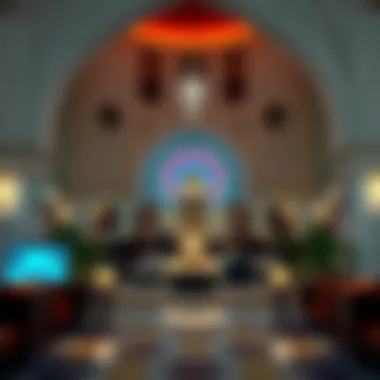
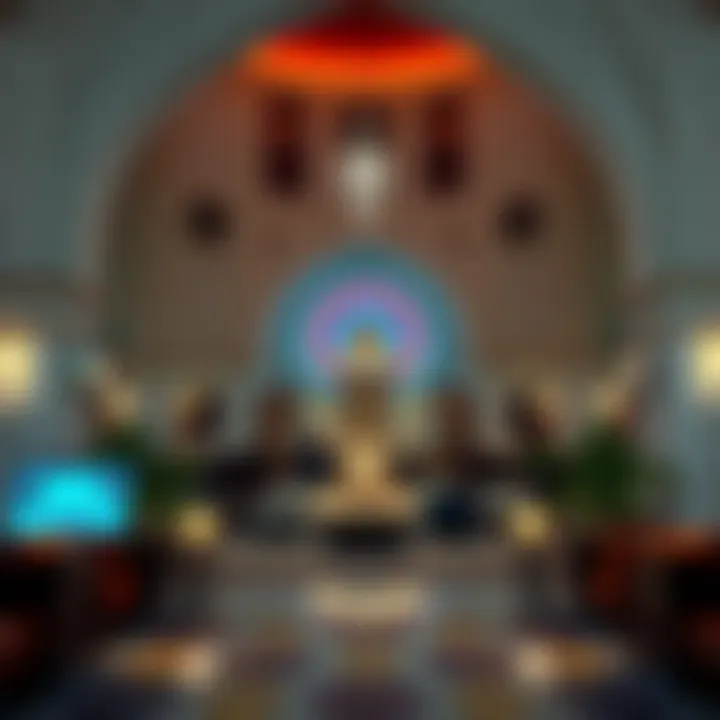
Understanding the timings of iftar goes beyond just checking your watch. It's influenced by various factors that intertwine geographic and astronomical elements. Knowing these factors not only enriches the experience but also helps in planning your evening meals and gatherings efficiently, especially for Dubai residents and visitors. The delightful anticipation of iftar can be significantly tied to these influences, allowing for a more fulfilling Ramadan journey.
Geographical Considerations
The geography of Dubai plays a pivotal role in when iftar is observed. Since Dubai lies near the Tropic of Cancer, the city experiences significant variations in daylight hours throughout the year. During Ramadan, the length of daylight affects the sunset time, which directly corresponds to iftar.
- Latitude and Longitude: The coordinates of Dubai dictate when the sun dips below the horizon. For instance, Dubai's latitude is approximately 25 degrees North. This means that during the holy month, iftar is later in summer when the sun sets around 7:00 PM, and earlier in winter when it could be around 5:45 PM.
- Urban Layout: Additionally, the dense urban architecture in Dubai affects light reflection, creating variations in sunset times across the city. In some areas, tall buildings may block sunlight longer, causing locals to rely on the mosque call to prayer.
These geographical aspects serve as a reminder that nature has its own timetable, enriching the communal experience of breaking fast.
Astronomical Calculations
Astronomy also plays a key role in determining iftar times. The moon's phases and its position relative to the Earth create a universal system for counting days during Ramadan. Knowing how these astronomical phenomena influence iftar can be intriguing and offers a unique approach to the month.
- Moon Sightings: Traditionally, the sighting of the crescent moon marks the beginning of Ramadan. Various communities may celebrate iftar on different days because of this variability in moon visibility based on location. In Dubai, local mosques often announce iftar time based on astronomical data combined with local sighting, creating an interest for astronomy enthusiasts.
- Local Prayer Times: Islamic authorities use calculations to determine prayer times in conjunction with the actual movement of the sun. These formulas account for geographical variations. For example, the Islamic Society of North America (ISNA) provides elaborated methods to calculate prayer times with accuracy.
To encapsulate, it’s vital to understand that both geographical and astronomical factors intricately weave together to dictate when iftar begins. This knowledge not only enhances the personal experience of Ramadan but also nurtures a sense of unity among the community sharing the holy month.
Cultural Practices Surrounding Iftar
In Dubai, the iftar meal marks an important moment during Ramadan, signifying more than just the end of a day of fasting. It’s a time where culture, tradition, and community intertwine, bringing families and friends together. Understanding these cultural practices surrounding iftar can deepen one’s appreciation for the holy month and provide insight into local customs and society.
During this sacred time, cultural practices play a pivotal role. It’s not simply about breaking the fast; it's a celebration that emphasizes unity, generosity, and gratitude. The meals often reflect a rich tapestry of Emirati heritage and regional flavors, showcasing local culinary traditions that have been passed down through generations.
Traditional Foods
When the sun sets, the aroma of traditional dishes wafts through homes and streets. Families gather around tables adorned with an array of delights. In Dubai, some of the most popular foods served during iftar include:
- Dates: These are usually the first thing consumed to break the fast. Their sweetness provides an instant energy boost after a long day of fasting.
- Luqaimat: These are sweet dumplings drizzled with date syrup. Their crispy exterior and fluffy interior create a delectable contrast that many look forward to during Ramadan.
- Shorba: This spiced soup serves as a comforting start to the meal, helping to warm the stomach after hours without food.
- Grilled Kebabs and Shawarma: These savory meats, often made with chicken or lamb and marinated with spices, are irresistible when served fresh with warm bread.
- Arabic Coffee (Gahwa): Often served in small cups, this traditional coffee accompanies many dishes and adds a touch of hospitality to the gathering.
The vibrant colors and flavors of these dishes are not just about nourishment; they are about sharing and bonding with those around. Families often prepare these meals together, creating a sense of collaboration and unity.
Community Gatherings
Iftar also extends beyond the walls of one's home, flourishing in community gatherings. Various venues throughout Dubai open their doors to create an inclusive atmosphere, welcoming all to partake in the meal after a day of fasting. Many mosques provide iftar meals to the public, promoting a spirit of charity and hospitality. This practice showcases the strong sense of community within the Emirati culture. It’s common to see long tables set up in parks and open areas where people from different backgrounds come together.
Such gatherings foster social connections that transcend cultural barriers. Locals and expatriates alike share a meal, engage in meaningful conversations, and celebrate together.
"Iftar is not just about the food; it's about breaking barriers and building friendships."
As people from various backgrounds share this ritual, they establish bonds that extend beyond the holy month. This sense of community enriches the experience of Ramadan, creating a unified tapestry of cultures and traditions in Dubai.
In summary, the cultural practices surrounding iftar comprise a blend of cherished traditions and communal gatherings. They foster a sense of belonging and connectedness among individuals while highlighting the rich culinary heritage of the Emiratis. For anyone engaging with the local community during Ramadan, understanding these practices is essential for a more enriching and immersive experience.
Popular Venues for Iftar in Dubai
When it comes to Iftar in Dubai, choosing the right venue is as crucial as the timing of breaking the fast. Different venues not only offer a variety of culinary experiences but also create a unique ambiance that can significantly enhance the overall experience of Ramadan. This section explores popular venues ranging from luxurious hotels to vibrant outdoor areas, shedding light on the benefits and considerations involved in selecting the right place for your Iftar gathering.
Hotels and Restaurants
Dubai is home to numerous world-class hotels and restaurants that offer tailored Iftar experiences, often designed with the spirit of Ramadan in mind. Establishments like the Burj Al Arab's Al Iwan, At.mosphere, and The Address Downtown not only provide exquisite dishes but also stunning views that are particularly mesmerizing as the sun sets. These places typically have special iftar buffets that feature an array of traditional dishes, as well as international cuisine, all designed to cater to a diverse palate.
When visiting these venues, it's wise to consider booking a table in advance, especially during the peak hours of Iftar. The allure of these hotels often attracts both residents and tourists, making the atmosphere lively yet sometimes crowded.
Additionally, many establishments offer family packages or group discounts, which can be a significant consideration for larger gatherings. It’s essential to check the prices, which can vary significantly, ensuring you find a venue that aligns with your budget without comporomising on the quality of food or service.
Many hotels in Dubai offer complimentary dates and water for breaking the fast, a nod to tradition in a lavish setting.


Outdoor Gatherings
For those who seek a more casual atmosphere or wish to enjoy the pleasant evening temperatures, outdoor gatherings are a fantastic choice during Ramadan. Parks such as Zabeel Park or Dubai Marina often host Iftar tents that encourage community spirit. These events can feature food stalls serving everything from traditional samosas to contemporary fusion dishes.
Outdoor venues provide a vibrant backdrop for socialization, with families setting up picnic-style settings to break their fast together. Here, it’s more common to meet new faces, creating an enriching environment. Community organizations often set up Iftar distribution points, which not only serve those observing the fast but likewise welcome all who want to partake in the meal.
One consideration for outdoor Iftar is the weather. While the evenings tend to cool down, it's wise to bring along light jackets or shawls as temperatures can drop unexpectedly. Also, arriving early can ensure you secure a good spot, as popularity tends to lead to a bustling environment as the time for Iftar approaches.
Ultimately, whether one chooses the elegance of hotels or the joviality of outdoor gatherings, the experience during Iftar in Dubai is undoubtedly enhanced by the companionship of loved ones and the spirit of the season.
For those keen on learning more about Iftar options and their respective venues, you can visit Dubai Restaurants or glean insights from local forums such as Reddit.
Health Considerations During Iftar
Iftar is more than just a time for breaking the fast; it is a moment steeped in tradition, connection, and nourishment. The way we approach our iftar can greatly impact not just our bodies, but also our overall well-being. Understanding health considerations during iftar can help residents and visitors in Dubai make responsible choices that contribute to long-term health, especially during this holy month of Ramadan.
Nutrition and Hydration
As the adhan calls for iftar, the body longs for hydration and nourishment after long hours of fasting. Proper nutrition and hydration play crucial roles in how effectively one can restore energy levels and maintain overall health. Here are some key points to consider:
- Hydration is Key: After fasting, the body requires fluids to recover from dehydration. It’s wise to break the fast with water or natural juices to kick-start hydration.
- Balance Your Plate: Aim for a mix of carbohydrates, protein, and healthy fats in your meals. Dates, for instance, offer natural sugars along with a boost of fiber, making them an excellent choice to replenish energy quickly.
- Avoid Overindulgence: It may be tempting to feast on lavish spreads, but calming the appetite is essential. Overeating can lead to discomfort and digestive issues. Moderation is a cornerstone to enjoying iftar without overtaxing the body.
Breaking the fast with balance in mind can make all the difference in feeling revitalized for evening activities.
Following iftar, don’t forget to continue hydrating. Water intake throughout the evening can significantly improve physical stamina and mental alertness.
Common Dishes and Their Benefits
In Dubai, iftar is a cultural feast showcasing a variety of traditional dishes, each with its own health benefits. Here’s a closer look at some staples often enjoyed at iftar:
Dates
Rich in fiber, dates are often the first food consumed to break the fast. Their natural sweetness provides a quick source of energy, and they're packed with essential minerals like potassium and magnesium, promoting heart health.
Lentil Soup
Warm and nourishing, lentil soup is a quintessential dish. Lentils are high in protein and iron, making them an excellent choice to restore energy. Plus, the warmth of the soup can be soothing after a day without food and drink.
Grilled Chicken
A popular protein choice, grilled chicken is low in fat and high in protein. Paired with spices, it adds flavor while providing amino acids necessary for recovery after fasting.
Fattoush Salad
This fresh salad, made with a variety of vegetables and sometimes pomegranate, offers hydration and a wealth of vitamins. Including a salad in your iftar can aid digestion and balance out heavier dishes.
Kunafa
For those with a sweet tooth, kunafa is a traditional dessert unique to iftar. Even though it is sweet, moderation is key since it can be high in calories. Just a small piece can satisfy a sweet craving while still being enjoyable.
Incorporating these specific dishes into your iftar not only enhances the cultural experience but also reaps health benefits that can sustain you through the demands of Ramadan. Choosing wisely ensures that the fast-breaking meal is both delightful and nurturing.
Staying mindful of nutrition and proper hydration can significantly enhance the Ramadan experience. It's about reconnecting to the body, the community, and the spirit of the month while safeguarding your health.
Engaging with the Community During Ramadan
During Ramadan, the community aspect of life tends to resonate louder. It’s not just about refraining from food; it’s about solidarity and sharing experiences. Engaging with the community provides both support and connection, enriching the month for everyone involved. In cosmopolitan places like Dubai, where diverse cultures meet, these engagements help foster mutual understanding and camaraderie. Through shared meals during iftar, volunteer efforts, and charitable actions, there’s a palpable sense of togetherness. Communities in Dubai come alive during this period, and there’s something for everyone to partake in.
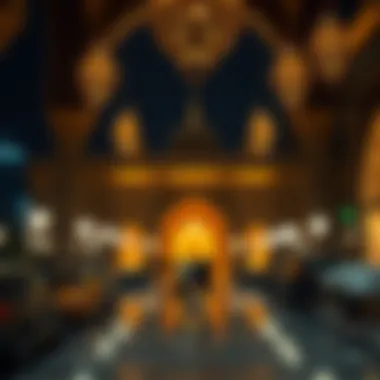
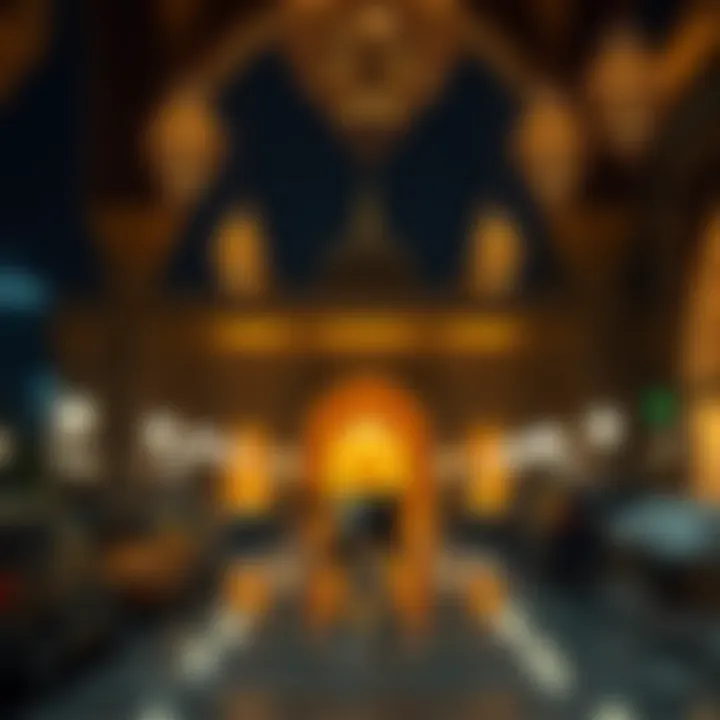
Volunteering Opportunities
The spirit of giving and empathy shines bright during Ramadan, and volunteering stands out as a primary avenue for those looking to lend a hand. Various organizations in Dubai, like the Emirates Red Crescent, offer numerous chances to participate in helping others.
Some popular volunteering avenues include:
- Food drives – Gathering and distributing food packages to families in need.
- Iftar events – Helping serve meals at community centers or public parks.
- Hospital visits – Sharing iftar meals with those unable to leave their beds.
Volunteering not only allows participants to help others but also spurs personal growth and satisfaction. It’s said that when you give, you also receive; this rings especially true during such a profound month.
"The best people are those who are most beneficial to others."
Charitable Contributions
Ramadan is synonymous with charity. Within the rich tapestry of cultural practices, contributing to those less fortunate becomes paramount. Many residents of Dubai allocate a portion of their income or time towards charitable causes during this holy month. Organizations like Dubai Cares and Islamic Relief provide numerous avenues for contributions, whether it be monetary donations or volunteering time.
Some impactful charitable contributions might include:
- Sponsoring iftar meals for less privileged individuals and families.
- Supporting local mosques in their outreach efforts to distribute food and essentials.
- Funding educational programs to ensure children have access to schooling throughout the year.
Incorporating charitable acts into daily routines not only aids in creating a better community but also reinforces the values of compassion and solidarity. As the saying goes, community uplifts when we uplift each other. Engaging in these practices turns the individual into a collective, marking Ramadan as a truly communal experience.
Adjusting to Time Changes During Ramadan
As the holy month of Ramadan graces the calendar, a unique rhythm envelops daily life, intricately woven with the timing of iftar. Grasping how to adjust to these changes is pivotal, particularly in a bustling city like Dubai. The day-to-day routines of residents ebb and flow as the sun sets, marking the moment when fasting concludes. It’s not just about keeping track of the hours; it’s about accommodating social obligations, personal well-being, and communal spirit during this significant period.
Being aware of today's iftar time is like having a compass. It guides individuals and families as they switch gears between a fast-paced life and the sacred observance of Ramadan. When iftar arrives, the call to prayer resonates through the streets, bringing with it a sense of camaraderie and community. This shared experience of breaking the fast can create wonderful bonds, framing the month as one of reflection and togetherness.
Impact on Daily Schedule
The time changes during Ramadan often demand a fresh look at daily schedules. With fasting hours stretching from dawn til dusk, adjustments must be made, especially when it comes to work, social events, and personal activities. Many individuals find they have to realign their energy—taking the time to rest during the day so they can fully engage in nighttime gatherings. Here are a few key considerations:
- Sleep Patterns: Nights may stretch longer as families gather for suhoor (the pre-dawn meal) and engage in social activities. It's crucial to balance sleep, perhaps by taking short naps during the day to maintain energy levels.
- Meal Timing: Breakfast becomes iftar, and mealtimes are shifted dramatically. Calendar reminders serve as the perfect cue to prep those culinary delights or head out for dinner with friends.
- Flexibility: Being adaptable is essential. Events or meetings typically scheduled during lunch hours may need to be moved, allowing fasting individuals time to rejuvenate.
Workplace Adjustments
For companies operating in Dubai, the month of Ramadan is a chance to demonstrate cultural sensitivity. Many workplaces adjust their hours to accommodate employees who are fasting. Understanding the impact of these changes ensures that the work environment remains conducive and supportive:
- Shortened Work Hours: Several organizations shift their operating hours to help employees manage their fasts without compromising productivity. This often results in a more relaxed atmosphere during the workdays, where staff can complete tasks without the usual stress.
- Cultural Events: Companies might hold iftar gatherings, fostering an inclusive environment. It’s an opportunity for team building and networking, allowing everyone to come together, breaking fast and sharing experiences. This also helps to boost morale and cultivate a sense of community within the office.
- Sensitivity Training: Employers can also provide awareness sessions or materials about Ramadan for non-Muslim employees, fostering a culture of understanding. It’s a chance to learn and appreciate the diversity that enriches workplaces in Dubai.
In this way, adjusting to time changes during Ramadan is not merely about managing schedules but embracing an opportunity to deepen connections and foster a rich community spirit. Using shared experiences to facilitate understanding can lead to stronger bonds, whether among colleagues or family members.
Ramadan isn’t just a month of fasting; it’s a journey of the heart that leads to deeper ties within the community.
Culmination: The Significance of Iftar in the Modern Context
Iftar, the evening meal with which Muslims break their fast during Ramadan, transcends mere sustenance. It resonates deeply within the fabric of contemporary society in Dubai. Today, Iftar has become a cultural cornerstone, reflecting both the traditional and modern dynamics of community life.
Iftar as a Cultural Connector
The practice of breaking fast is not just about eating; it embodies community spirit and social ties. In Dubai, Iftar gatherings often bring together family, friends, even strangers, fostering bonds that strengthen the community's social cohesiveness. This communal aspect is particularly important in a cosmopolitan city where diverse cultures intersect.
- Shared Experiences: Many residents invite neighbors over, regardless of their backgrounds, highlighting the inclusive spirit of Ramadan. Each meal can be a cultural exchange as different traditions blend—think dates offered alongside Filipino lumpia or Indian biryani shared with Emirati khubs.
- Community Engagement: Local mosques frequently host Iftar dinners. These events are not merely meals but initiatives encouraging charitable acts and fraternity among participants. People contribute different dishes, merging flavors and narratives in the simplest of gatherings.
"Food is the common language that unites us during Ramadan."
The significance of Iftar within the community is underscored by the collective effort to ensure that every person, regardless of their means, can partake in these meals, highlighting a shared commitment to compassion and charity.
Looking to the Future
As we look ahead, there are several factors shaping the future of Iftar in Dubai and its significance:
- Adapting Traditions: Modern technology, such as social media, plays a pivotal role in what Iftar means today. Families and restaurants share their Iftar menus online, enticing a wider audience and encouraging culinary creativity. This adaptation reflects a broader trend of globalization where local customs incorporate external influences while retaining their essence.
- Sustainability Efforts: With increasing awareness of environmental issues, many congregations and organizations are moving toward sustainable practices during Ramadan. Reducing waste during Iftar, promoting vegan options, and sourcing local ingredients mark a shift in the community's approach to meals. Sustainability merges seamlessly with tradition, promising a more responsible future for the festivities.
Looking to the future, iftar's role will invariably expand as it continues to intertwine with the contemporary lifestyle of Dubai's residents. Education about these evolving practices will pave the way for a richer understanding of Ramadan's profound significance, ensuring that the essence of Iftar—community, connection, and compassion—remains timeless amidst modern changes.

